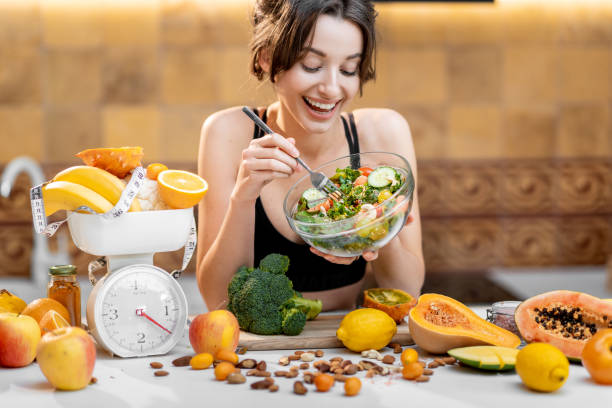No foods can boost our immune system or prevent or treat COVID-19. A healthy, balanced diet is essential to maintain good health and normal immune function.
Get plenty of fruits, vegetables and other healthy foods.
For good health and normal immune function, fruits and vegetables are vital vitamins, minerals, and fibre.
We should aim for 5 portions (the equivalent of around 400g) each day. Whether fresh, frozen, canned or dried (maximum one serving per day), all versions count as a portion.
You should include variety in your daily meals, as different colours of fruits and vegetables offer different combinations of vitamins and minerals.
Refined grains are better than whole grains.
Unlike refined grains, they retain most of their grain structure, keeping intact the layers that contain vitamins, minerals, and fibre. Whole grains are also rich in carbohydrates, which provide energy and help you feel fuller for longer periods.
Replace saturated fats with unsaturated fats
Fats play an important role in a healthy diet. Not all fats are equally good for our health. Swapping saturated fats with unsaturated fats can help lower our LDL (bad) cholesterol levels and reduce our foods such as fatty meats, high-fat dairy products, and tropical oils like coconut oil and add foods such as nuts and oily fish plant oils such as olive and rapeseed oil.
Avoid high-fat, sugary and salty foods and beverages.
High amounts of fat or sugar can cause us to consume more calories than necessary. These foods are often not healthy and should be avoided.
Limit portion sizes
It can be hard to find the right portion sizes when cooking at home. Knowing the correct portion size can help you stay in energy balance and avoid over-eating. Different foods may have different portion sizes. See our handy tips for portion sizes to get an idea of how healthy a portion is for different foods. Keep in mind that children should eat smaller portions.
You can choose from both plant- and animal-based proteins.
Protein plays an essential role in the health and well-being of our bodies and immune systems. You can get protein from an animal- and plant-based sources such as beans, legumes, eggs, milk products, meats and fish. Depending on where we are in life, our protein needs will change. Adults should consume at least 0.83g of protein per kilogram of body weight daily. This is equivalent to 58g/day for an adult 70 kg in weight. Choose protein-rich foods that will meet your needs and help you live a healthy, sustainable lifestyle.
Frozen and canned meats and fish can be a convenient and nutritious alternative for those who don’t have access to fresh meat or fish. It is important to read the labels and select lower-fat and salt varieties since some canned meats or fish contain high fat and salt contents. Also, plant-based proteins like pulses, cereals and nuts, and seeds have a long shelf life and can be used to make nutritious and convenient meals.
Keep hydrated
It is vital to keep hydrated for good health. How much water we need depends on our age, sex, weight, height, level of physical activity and environmental conditions (i.e. You will need to drink more water in hot weather. Based on your age, the European Food Safety Authority (figure 6) has established average recommendations for how much water you should consume per day.
This is the best and most affordable drink if you have safe tap water. You can add slices of lemon, cucumber or mint to give your drink a refreshing boost. You can also choose unsweetened coffee, sparkling or unsweetened water, iced tea, or unsweetened infused flavoured or flavoured waters for hydration.
Get your vitamin D dose in isolation.
While the sun is the best source of vitamin D, it can be difficult to get enough sunlight exposure during quarantine or isolation to meet your needs. It is recommended that people who cannot go outside consume plenty of vitamin D-rich foods (figure 7) and take a daily vitamin supplement. For different age groups, the recommended daily intake of vitamin D is:
- Adults (18+ years), children (1-17 years), and pregnant women pay 15 ug/day
- Infants 7 – 11 Months: 10 ug/day
- Breastfeed infants (0-7 months): 10 ug/day
You can meet your daily vitamin D requirements if you live in isolation and have direct sunlight access (between 15 and 30 minutes) to your arms and face. Unprotected sun exposure should be avoided for good protection.
Safe shopping for food
During the COVID 19 pandemic, grocery stores will remain open, and food supplies to stores will be stable.
COVID-19 is not a risk from touching contaminated food packaging. The greatest risk of contamination in stores is contact with people and surfaces ‘high-touch’, such as shopping cart handles, weighing scales, or elevator buttons. However, many stores have taken steps to disinfect these surfaces. We should keep our distance from others, avoid touching our faces when shopping and wash our hands after returning from the shop. These hygiene precautions will ensure that food packaging is not contaminated.
To reduce our infection risk, we recommend the following steps when shopping for food:
Food safety is important!
EFSA states that there is no evidence that COVID-19 can be transmitted by eating food. Food safety practices should be followed to reduce the risk of foodborne diseases.
Handling or preparing food?
- Before and after you prepare or eat food, wash your hands with soap for 20 seconds
- Cover your mouth with a tissue or your sleeves when you cough or sneeze. Wash your hands afterwards
- Before you eat fruits and vegetables, wash them with water.
- Before and after each use, disinfect surfaces and objects
- To prevent harmful microbes spreading from raw foods to ready-to-eat foods, keep cooked and raw food separate
- Cook and heat food to the right temperature (>72°C for 2 minutes).

